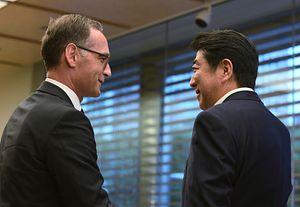Germany and Japan have the potential to be “at the heart of an alliance of multilateralists” amid “huge upheavals” in the world. That was the message of German Foreign Minister Heiko Maas as he laid out an ambitious vision for closer bilateral cooperation during a visit to Tokyo on July 25.
Maas chose Japan as his first Asian destination since being appointed as foreign minister in March. He met with his Japanese counterpart, Taro Kono, for two hours.
The meeting came just a week after European leaders and Japanese Prime Minister Shinzo Abe signed a landmark economic partnership agreement, which is to create the largest free trade zone in the world. The agreement was accompanied by a strategic partnership agreement that paves the way for closer coordination between Japan and the European Union on a range of pressing areas.
Kono said he intended to coordinate more closely with Germany, which he noted would begin a two-year term as a non-permanent member of the UN Security Council next year. According to the Japanese government’s summary, Kono described Japan and Germany as “important partners that lead Asia and Europe respectively, and which address the various problems facing the international community based on common fundamental values.”
Maas gave a substantive address on his outlook for the bilateral relationship during a speech later in the day to the National Graduate Institute for Policy Studies in Tokyo.
Citing examples of the upheavals facing the world, Maas described North Korea’s nuclear and missile tests of the past couple of years as greatly concerning. In Europe, meanwhile, the fighting in eastern Ukraine and refugee flows from Syria and Iraq had “certainly shown us that we do not in fact live in blissful isolation” in Europe.
Maas noted there was increased uncertainty about the course pursued by the United States under President Donald Trump, “who also calls alliances that have developed over decades into question in 280-character tweets.” Further, Russia had “openly challenged the world order through its illegal annexation of Crimea and its conduct in the conflict in Syria and elsewhere,” Maas said. China, he continued, “wants to shift the geopolitical balance of power to its own advantage and is demanding what I would describe as allegiance from many countries in its neighborhood.”
In this context, Maas said, Germany and Japan needed to “stand shoulder to shoulder” because they shared the same values and were “too small to be able to call the shots on their own” on the world stage.
He elaborated: “Individually, each of us will continue to find it difficult to be a ‘rule maker’ in a multipolar world. But this does not mean we want to content ourselves with the role of ‘rule takers.’ If we pool our strengths – and we can do so to a greater extent than we have done in the past – perhaps we can become something like ‘rule shapers,’ who design and drive an international order that the world urgently needs.”
Maas added some detail to his proposal for Germany and Japan to be at the center of what he termed “an alliance of multilateralists.” This would be a grouping that:
- defends existing rules together and continues to develop them where this is necessary;
- shows solidarity when international law is trampled underfoot on each others’ doorsteps;
- fills the vacuum that has continued to emerge following the withdrawal of others from many parts of the world stage;
- is committed to climate protection as one of the greatest challenges facing humankind;
- assumes responsibility in international organizations together – financially, but also politically.
Maas argued such an alliance was particularly important in Asia, as the region was economically interlinked but often divided politically. It would, he said, “also help to support all of the countries in this region that may find it even more difficult than Germany or Japan when it comes to actually making their voices heard.”
On the trade front, Maas highlighted how the EU-Japan deal had created new standards for global trade in environmental and climate issues, consumer protection, social standards, and competition law. Ongoing negotiations on investment protection arrangements could also result in new standards in this area, Maas said.
“That’s what I mean by the term ‘rule shaper’ in quite practical terms,” he said. “However, it is perhaps even more important to send a signal both eastwards and westwards – one that says that we don’t think of free trade as a zero-sum game. Trade with reliable rules creates prosperity for everyone at the end of the day.”
Maas added, however, that the World Trade Organization needed to be modernized. He suggested Germany and Japan could act as pioneers in developing modern rules for digital trade and for dealing with state enterprises. The minister also suggested trilateral cooperation with the United States, wherever possible, to fight against unfair practices such as the obstacles companies face in accessing markets in China.

































